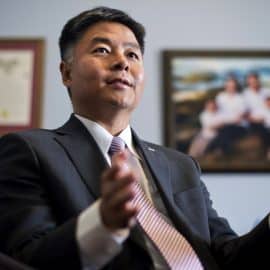


| PersonalBrand Presence | 7 / 10 |
| Authoritativeness | 7 / 10 |
| Expertise | 7 / 10 |
| Influence | 6 / 10 |
| Overall Rating | 7 / 10 |
As of 2023, Ted W. Lieu, a skilled lawyer, politician, and former military personnel, has the honor of representing the 36th congressional district in the House of Representatives for the United States, covering the state of California. For the previous eight years, from 2015 to 2023, he took charge as the representative for the 33rd district.
Ted Lieu is one of the eighteen members of Congress who gained U.S. citizenship after moving from Taiwan when he was just three years old. He made his mark in California politics by succeeding the late Senator Jenny Oropeza, stepping into the role within the California State Senate from 2011 to 2014. Additionally, he represented the 53rd district in the California State Assembly from 2005 to 2010, filling the position left by deceased Assemblyman Mike Gordon.
Between 1995 and 1999, Lieu was a part of the Judge Advocate General’s Corps during his active service in the Air Force. He continued to serve in the Air Force Reserve Command until 2021, where he achieved the rank of colonel by 2015. In 2017, House Democratic Leader Nancy Pelosi appointed him as assistant whip for the 115th Congress. As of 2023, he holds the position of vice chair for the House Democratic Caucus.
There has been a notable surge in bipartisan enthusiasm regarding artificial intelligence in the past year. Over thirty new legislative measures regarding AI have been proposed this session, with nearly thirty sessions conducted by both House and Senate committees to discuss related issues. Several senators from both parties have released their frameworks for a comprehensive regulatory approach to AI. Likewise, proposals focused primarily on the internal application of AI in federal agencies have been voted on and passed through committees.artificial intelligence Meanwhile, the administration led by Biden has announced plans to put forth an extensive executive order this autumn that aims to tackle a variety of threats posed by AI, adhering to the current legislative framework. Additionally, the Administration has secured voluntary commitments from fifteen technology firms to prioritize AI safety and transparency during the development of their systems.
The future of comprehensive AI regulation remains uncertain due to the absence of a clear consensus. However, there are over a dozen bipartisan proposals across both Congressional chambers addressing a wide range of AI-related topics. So far, targeted legislative efforts have surfaced, aimed at safeguarding U.S. elections against deepfakes and misleading AI-generated content, bolstering the nation's position in AI research and development, securing national security, mandating AI usage disclosures, and examining the impact of AI on American employment—all while facilitating its judicious use by the federal government. With growing interest and support from both sides of the aisle, it appears likely that at least some of these focused AI proposals may soon become law.
Despite pressure from labor unions, Pennsylvania’s House Environmental Resources and Energy Committee has decided against implementing a two-year halt on cryptocurrency mining.
Artificial intelligence is transforming healthcare in several powerful ways, from discovering new genetic links to enhancing robotic surgical procedures...
Know MoreTed Lieu, a Congressman representing the U.S. Congress and a notable figure in the Metaverse space.
Know More